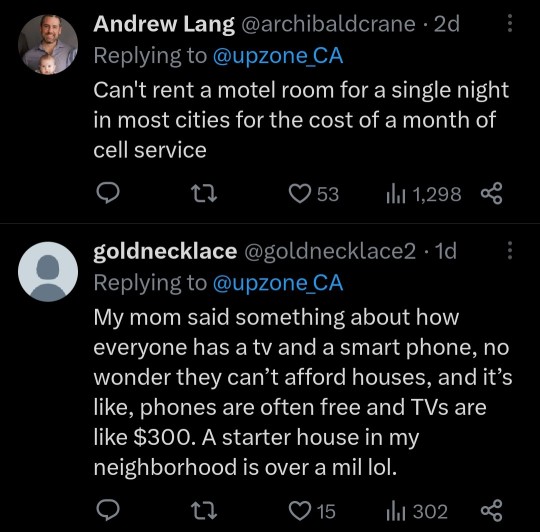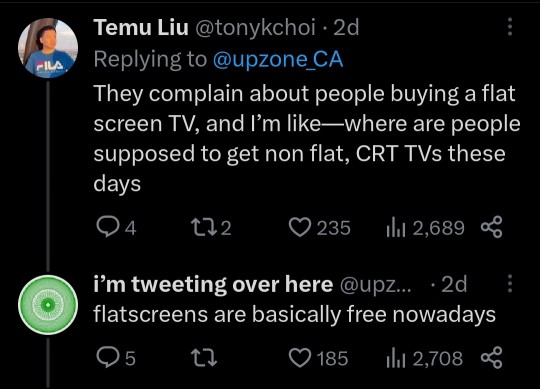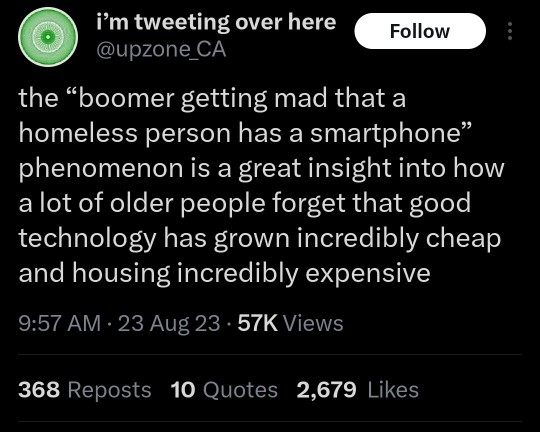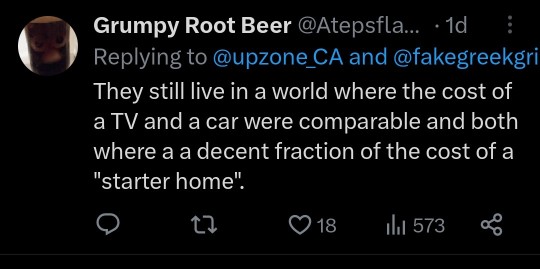#Boomers
Text
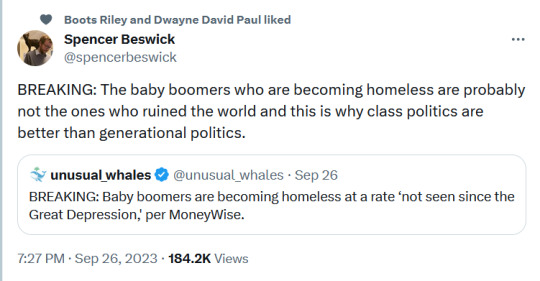
#twitter#tweet#tweets#boomers#economics#economy#homeless#class politics#generational politics#class#inequality#wealth inequality
51K notes
·
View notes
Text
I mean, we knew, but it's nice to hear so succinctly
31K notes
·
View notes
Text
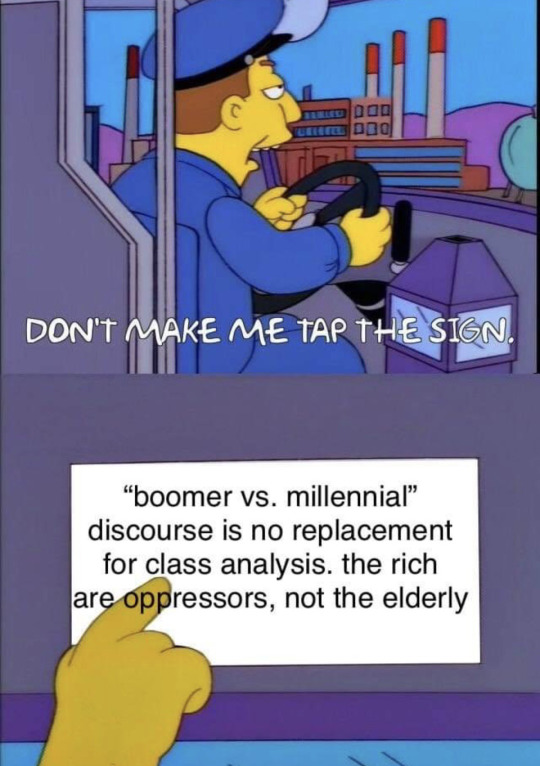
#the simpsons#the simpsons memes#class war#boomers#millenials#eat the rich#eat the fucking rich#random facts#fun facts#factsnfunnypics#jack facts#facts#fact of the day#fact check#fact#ausgov#politas#auspol#tasgov#taspol#australia#fuck neoliberals#neoliberal capitalism#anthony albanese#albanese government#this has been a psa#antifaschistische aktion#antifascist#anti zionisim#anti capitalism
2K notes
·
View notes
Text
Hazel Chandler was at home taking care of her son when she began flipping through a document that detailed how burning fossil fuels would soon jeopardize the planet.
She can’t quite remember who gave her the report — this was in 1969 — but the moment stands out to her vividly: After reading a list of extreme climate events that would materialize in the coming decades, she looked down at the baby she was nursing, filled with dread.
“‘Oh my God, I’ve got to do something,’” she remembered thinking...
It was one of several such moments throughout Chandler’s life that propelled her into activist spaces — against the Vietnam War, for civil rights and women’s rights, and in support of environmental causes.
She participated in letter-writing campaigns and helped gather others to write to legislators about vital pieces of environmental legislation including the Clean Air Act and the Clean Water Act, passed in 1970 and 1972, respectively. At the child care center she worked at, she helped plan celebrations around the first Earth Day in 1970.
Now at 78, after working in child care and health care for most of her life, she’s more engaged than ever. In 2015, she began volunteering with Elder Climate Action, which focuses on activating older people to fight for the environment. She then took a job as a consultant for the Union for Concerned Scientists, a nonprofit science advocacy organization.
More recently, her activism has revolved around her role as the Arizona field coordinator of Moms Clean Air Force, a nonprofit environmental advocacy group. Chandler helps rally volunteers to take action on climate and environmental justice issues, recruiting residents to testify and meet with lawmakers.

Pictured: Hazel Chandler tables at Environment Day at Wesley Bolin Plaza in front of the Arizona State Capitol in Phoenix, Arizona, in January 2024.
Her motivation now is the same as it was decades ago.
“When I look my grandchildren and my great-grandchildren, my children, in the eye, I have to be able to say, ‘I did everything I could to protect you,’” Chandler said. “I have to be able to tell them that I’ve done everything possible within my ability to help move us forward.”
Chandler is part of a largely unrecognized contingent of the climate movement in the United States: the climate grannies.
The most prominent example perhaps, is the actor Jane Fonda. The octogenarian grandmother has been arrested during climate protests a number of times and has her own PAC that funds the campaigns of “climate champions” in local and state elections.
Climate grannies come equipped with decades of activism experience and aim to pressure the government and corporations to curb fossil fuel emissions. As a result they, alongside women of every age group, are turning out in bigger numbers, both at protests and the polls. All of the climate grandmothers The 19th interviewed for this piece noted one unifying theme: concern for their grandchildren’s futures.
According to research conducted by Dana R. Fisher, director for the Center of Environment, Community and Equity at American University, while the mainstream environmental movement has typically been dominated by men, women make up 61 percent of climate activists today. The average age of climate activists was 52 with 24 percent being 69 and older...
A similar trend holds true at the ballot box, according to data collected by the Environmental Voter Project, a nonpartisan organization focused on turning out climate voters in elections.
A report released by the Environmental Voter Project in December that looked at the patterns of registered voters in 18 different states found that after the Gen Z vote, people 65 and older represent the next largest climate voter group, with older women far exceeding older men in their propensity to list climate as their No. 1 reason for voting. The organization defines climate voters as those who are most likely to list climate change, the environment, or clean air and water as their top political priority.
“Grandmothers are now at the vanguard of today’s climate movement,” said Nathaniel Stinnett, founder of the Environmental Voter Project.
“Older people are three times as likely to list climate as a top priority than middle-aged people. On top of that, women in all age groups are more likely to care about climate than men,” he said. “So you put those two things together … and you can safely say that grandma is much more likely to be a climate voter than your middle-aged man.”
In Arizona, where Chandler lives, older climate voters make up 231,000 registered voters in the state. The presidential election in the crucial swing state was decided by just 11,000 votes, Stinnett noted.
“Older climate voters can really throw their weight around in Arizona if they organize and if they make sure that everybody goes to the polls,” he said.
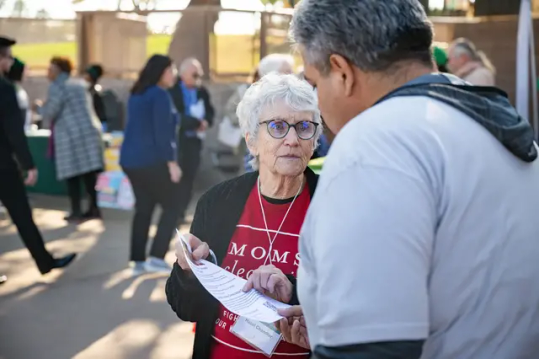
Pictured: Hazel Chandler’s recent activism revolves around her role as the Arizona field coordinator of Moms Clean Air Force, a nonprofit environmental advocacy group.
In some cases, their identities as grandmothers have become an organizing force.
In California, 1000 Grandmothers for Future Generations formed in 2016, after older women from the Bay Area traveled to be in solidarity with Indigenous grandmothers protesting the construction of the Dakota Access Pipeline at the Standing Rock Sioux Reservation.
“When they came back, they decided to form an organization that would continue to mobilize women on behalf of the climate justice movement,” said Nancy Hollander, a member of the group.
1000 Grandmothers — in this case, the term encompasses all older women, not just the literal grandmothers — is rooted at the intersection of social justice and the climate crisis, supporting people of color and Indigenous-led causes in the Bay Area. The organization is divided into various working groups, each with a different focus: elections, bank divestments from fossil fuels, legislative work, nonviolent direct actions, among others...
“There are women in the nonviolent direct action part of the organization who really do feel that elder women — it’s their time to stand up and be counted and to get arrested,” Hollander said. “They consider it a historical responsibility and put themselves out there to protect the more vulnerable.”
But 1000 Grandmothers credits another grandmother activist, Pennie Opal Plant, for helping train their members in nonviolent direct action and for inspiring them to take the lead of Indigenous women in the fight.
Plant, 66 — an enrolled member of the Yaqui of Southern California tribe, and of undocumented Choctaw and Cherokee ancestry — has started various organizations over the years, including Idle No More SF Bay, which she co-founded with a group of Indigenous grandmothers in 2013, first in solidarity with a group formed by First Nations women in Canada to defend treaty rights and to protect the environment from exploitation.
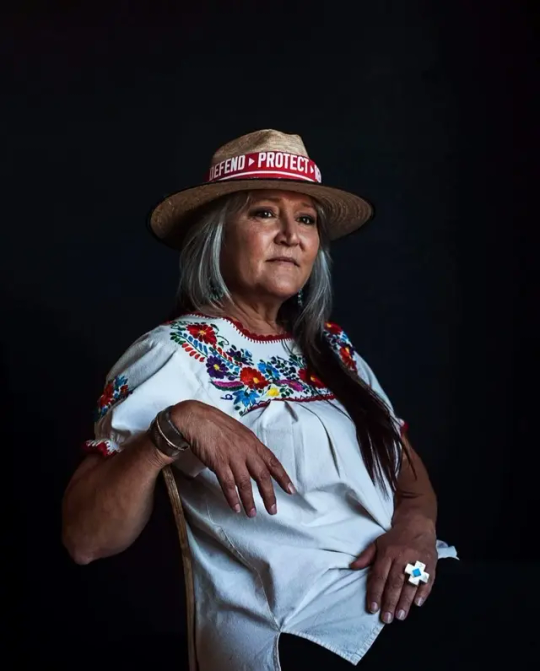
Pictured: Pennie Opal Plant has started various organizations over the years, including Idle No More SF Bay, which she founded in 2013 alongside Indigenous grandmothers.
In 2016, Plant gathered with others in front of Wells Fargo Corporate offices in San Francisco, blocking the road in protest of the Dakota Access Pipeline, when she realized the advantages she had as an older woman in the fight.
As a police liaison — or a person who aims to defuse tension with law enforcement — she went to speak to an officer who was trying to interrupt the action. When she saw him maneuvering his car over a sidewalk, she stood in front of it, her gray hair flowing. “I opened my arms really wide and was like, are you going to run over a grandmother?”
A new idea was born: The Society of Fearless Grandmothers. Once an in-person training — it now mostly exists online as a Facebook page — it helped teach other grandmothers how to protect the youth at protests.
For Plant, the role of grandmothers in the fight to protect the planet is about a simple Indigenous principle: ensuring the future for the next seven generations.
“What we’re seeing is a shift starting with Indigenous women, that is lifting up the good things that mothers have to share, the good things that women that love children can share, that will help bring back balance in the world,” Plant said...
[Kathleen] Sullivan is one of approximately 70,000 people over the age of 60 who’ve joined Third Act, a group specifically formed to engage people 60 and older to mobilize for climate action across the country.
“This is an act of moral responsibility. It’s an act of care. And It’s an act of reciprocity to the way in which we are cared for by the planet,” Sullivan said. “It’s an act of interconnection to your peers, because there can be great joy and great sense of solidarity with other people around this.”
-via The 19th, January 31, 2024
#climate change#climate activism#climate crisis#climate action#grandmother#older adults#elders#feminism#climate hope#family#intergenerational relationships#grandchildren#climate protest#good news#hope#hopepunk#environment#environmental activism#hope posting#boomers#gen z#age
760 notes
·
View notes
Text

Source: Ada Elder
#witchcraft#humor#skull#pagan#occult#spells#witch#occultism#witchy#paganism#witches vs patriarchy#prayer#gothic#goth#spellwork#witchblr#dark humor#wicca#boomers#jokes#spooky#creepy#lol#dark#my shitposts
2K notes
·
View notes
Text
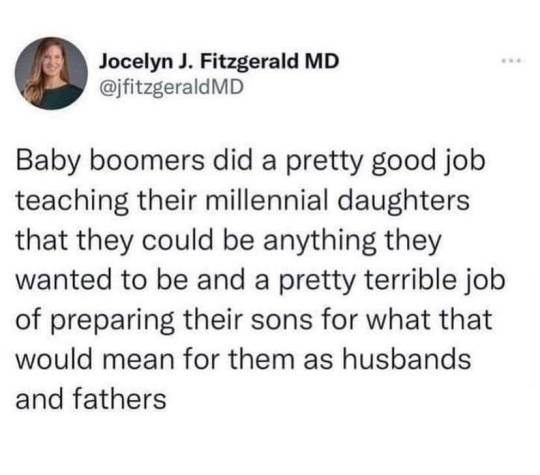
When higher expectations are expected from men, the weak seek out misogyny/patriarchy.
907 notes
·
View notes
Text

1K notes
·
View notes
Text
"Society flourishes when old men plant trees whose shade they'll never know."
Boomers grew up in the shade of trees planted by greater generations and when they got older they cut those trees down and sold the lumber to go play slots in Florida in retirement.
953 notes
·
View notes
Text

659 notes
·
View notes
Text

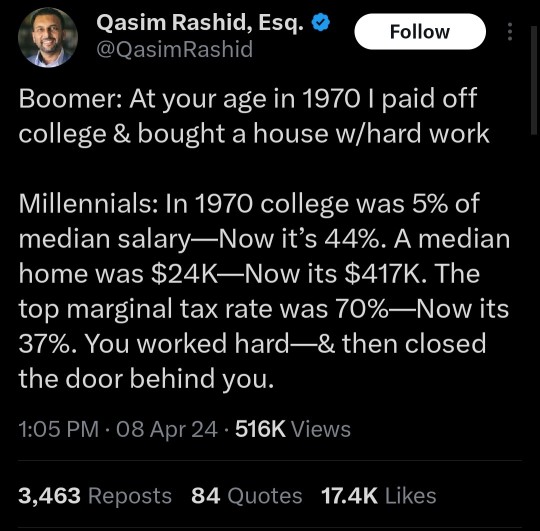
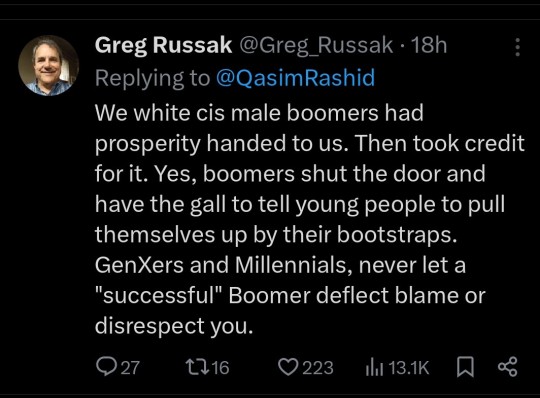
11K notes
·
View notes
Text



404 notes
·
View notes
Text
It’s crazy to me hearing Boomers and Millennials talk about what they wanted to be when they grew up. Being Gen Z, most of us have resigned to the fact that we will be poor for the rest of our lives unless some miracle of biblical proportion happens, a revolution occurs and the structures of government and economy are fundamentally altered, or we enter into a relationship with an unhealthy power balance. Owning a bed with a headboard looks like wealth and luxury that we’ll never be able to have. Actually OWNING a house?? Unimaginable. Being in a financial state where we don’t have the constant threat of hunger and destitution hovering over our heads? Nearly impossible. We aren’t afraid of the pain involved in a health crisis, we’re afraid of the expense. Yet I live in the greatest country in the world?
#gen z#gen z things#millenials#boomers#democratic socialism#socialism#communism#anarchism#anarchocommunism#recession#economy#government#america#anti capitalism
812 notes
·
View notes
Text

😂🤣😂
Tumblr — Twitter — Facebook — Instagram— Support me on Patreon
#comic#comics#comix#webcomic#webcomics#art#artists on tumblr#illustration#nhoj#boomer#boomers#boomer humor
116 notes
·
View notes
